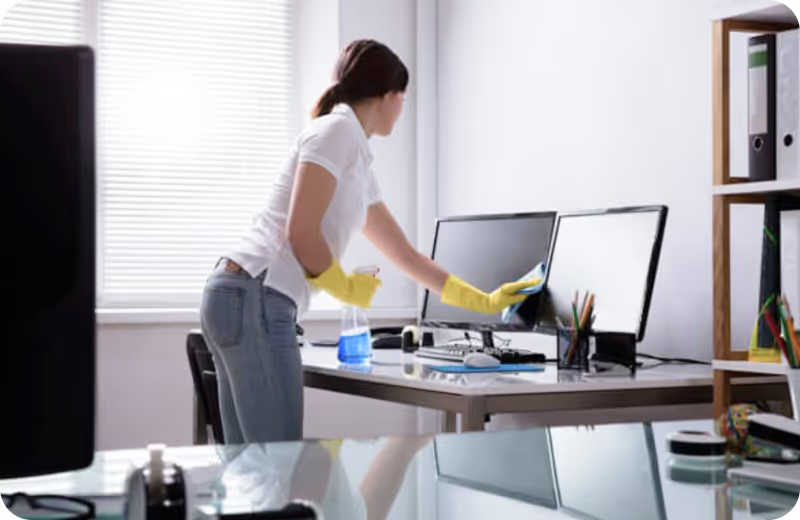
Love cooking but hate the cleanup? Maintaining a clean and stain-free stove top is essential for any healthy cooking, but the mess left behind after food preparations can be difficult to clean. Plus, the stove grates make food spills difficult to reach, so you need to remove these parts to get a complete clean.
In this article, we'll present to you the step-by-step process to clean your stove top. You'll get rid of all those grease splatters, food particles, and oils that happen during your food preparation. Here's how you can get started on cleaning your gas stove or induction cooker:
How to Clean a Gas Stove
First Things First
- Dish soap
- Sponge with an abrasive side
- Scrub brush
- Baking soda
- White vinegar
Step 1: Let the Stove Cool Completely
If the stove is still hot, let the gas stove top cool completely or until it is warm but manageable to the touch. Gas burner caps, much like electric coil burners, can get very hot, even when the surroundings have cooled down. You wouldn't want to burn yourself trying to clean a blistering hot stove top, so it is best to wait until the stove is completely cool.
Step 2: Remove the Stove Grates
Remove the stove grates. You'll be cleaning these separately under running water with some dish soap. Unlike glass stove tops, gas and electric coil burners have a lot of nooks and crannies where dirt, food debris, and other grime can get stuck in. Removing the stove grates gives you access to these areas.
Step 3: Wipe Down the Stove
Create your soapy water solution by mixing 2 teaspoons of dish soap for every 2-3 cups of water. The more concentrated you create the solution, the better it will be at removing oils. Use a sponge or cloth to wipe down the stove, getting between the stove tops, and underneath the burner caps.
Use the abrasive side of the sponge to clear away any dirt present on the stove. You can clean a stove top with moderate pressure if the material is made mostly from stainless steel. Wipe in circular motions to prevent streaks, and wipe to "rinse" the stove top afterwards with a damp cloth.
Step 4: Wash the Stove Grates
A gas stove top would often have grates that can be removed and washed separately. Clean a stove top grate by running it under water, and using a scrub brush to brush the corners clean. Use baking soda and vinegar to remove any stuck-on burnt bits. Rinse the gas stove top grates, or wipe it down with a damp cloth. Let it dry before placing it back onto the stove top.
Step 5: Spot Clean Stains
For stubborn, dried up, or burnt stains, you can use a baking soda paste made from baking soda and vinegar. Let the baking soda and vinegar sit directly on stained areas to soften them, then wipe the muck away after 15 minutes. Alternatively, you can sprinkle baking soda around the stove, then spray the area with vinegar to set off a reaction that will lift stains.
Also read: How to Clean a Black Stove Top
How to Clean an Induction Cooker (Electric Stove)
What You'll Need
- Soapy water OR
- Glass cleaner
- Soft sponge
- Microfiber cloth
- Baking soda
- Hot water
- Paper towel
Step 1: Clear the Stove
Remove any pots or pans from the induction (electric) stove, and make sure your stove is turned off before you start cleaning. If the stove top is still hot, wait for it to cool down before you start cleaning it to avoid burning yourself and your tools.
Step 2: Wipe the Stovetop Surface with a Damp Cloth
Wipe the surface of your stove top with a cloth or sponge dampened with your preferred cleaning solution: glass cleaner, or diluted dish soap works best to clear the grime from glass surfaces. Wipe the entire surface clean until you no longer see any oil or grease residue.
Step 3: Soften Burnt Food with Baking Soda and Hot Water
For any spots that have stubborn burnt marks, apply a paste made of baking soda and hot water directly onto the burnt bits. Drench a paper towel or small piece of cloth in hot water, and squeeze out the excess moisture until it is no longer dripping. Drape the cloth over the baking soda paste, and wait for 10 minutes.
After 10 minutes, check to see if the burnt bit has softened. If it has, simply use the cloth to wipe the food particles clean. If not, then repeat the process with a new batch of baking soda and hot water.
Step 4: Wipe the Stove with a Dry Cloth
After cleaning the stove, it is a good idea to wipe the surface dry to finish off cleaning the stove top. Use a clean, microfiber towel so you don't leave fibers behind, and you're ready to cook up a new recipe on your freshly-cleaning induction cooker!
What to Avoid When Cleaning a Stove Top
Depending on the type of stove you have, you may need different cleaning methods to keep your stove pristine. Allowing burnt food particles to stay on the stove is a recipe for disaster, as the oils from the food can cause a fire, particularly for a gas stove. Here are some things you should avoid when cleaning your stove top:
- Do not get a gas stove drenched in cleaning solution. The best case scenario would be that your stove may flicker due to the presence of moisture near the burner heads. The worst case scenario would be that the cleaning solution catches on fire.
- Do not use flammable cleaning solutions to clean stove burners. Cleaning solutions with alcohol, oils, or other flammable ingredients should not be anywhere near open fire or heat sources. Same goes for cleaning tools that easily catch on fire.
- Do not clean the stove while cooking. Not only is it a futile effort, you risk burning yourself and possibly your cleaning tools.
- Do not scrape stuck on food using steel wool or other abrasive scrubbers, especially on a glass stove top as these tools may leave scratches on the glass surface.
One-Stop Cleanup
Luce is your trusted partner in cleaning your home from top to bottom. From the bathroom to the bedroom, and even the kitchen, our experienced cleaners are equipped to handle touch stains, marks, and other messes.
Give us a call today, and let us handle those chores for you!





























